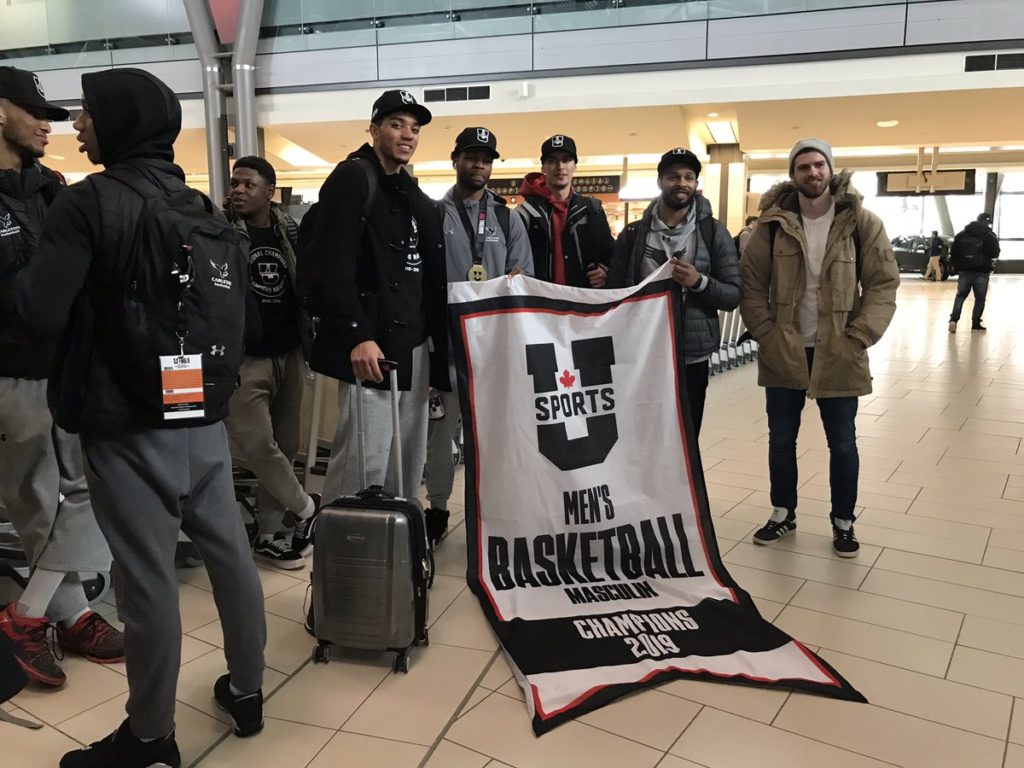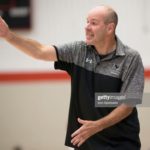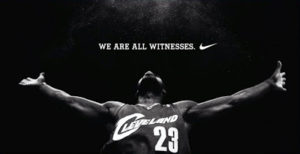[8-minute read]
They were coming down the escalator, the whole team and its coaches and support staff, and there must have been a few dozen friends and family members along for the ride, too. I was virtually there thanks to the randomness of the Twitterverse, watching video shot by somebody at the Ottawa airport (#YOW!) as the Carleton Ravens men’s basketball team returned home, victorious again, from the Canadian university championships. I kept waiting for the punchline, the birthday shout of “SURPRISE!!” Confetti, maybe? A brass band? Something.

Ravens at the Ottawa Airport. That’s Marcus with his back turned, Big Eddie left of the banner with a suitcase, gritty Mitch on the other side. (photo by YOW staff)
I was waiting for the welcome, but I wasn’t actually expecting one. I’ve seen this show before. I retweeted the video, added a snide comment – they must have edited out the adoring fans and their roars of appreciation! – but it would have been surprising (and delightful) if there had been a crowd there. After so many championships, such unremitting quality, most Ravens home games are nowhere near sold-out, even though it’s a modest size and every seat is close to the action. Those lunatic student sections we see on American TV? At most Ravens home games, there are fewer students in the crowd than there are cheerleaders. Large swathes of Ottawa residents get right giddy if the local pro hockey millionaires so much as sniff the playoffs; the Senators are routinely mediocre and often appear to be poorly run. But the Ravens? Ottawa is just not that into them.
This is surely a place I go and a thing I write to feel special, in a why doesn’t anybody else GET how GOOD this is? sort of way. I’m not completely alone. There are plenty of others who understand how astounding are the accomplishments of this under-appreciated athletic powerhouse. Even cable giant Sportsnet’s Tim Micallef – once a year, mind you – brings real enthusiasm and knowledge to his praise of U SPORTS¹ basketball in general, and the mighty Ravens in particular. The final games in the tournament had high production values to go along with the fine play. What’s more, back in 2014, the American sportswriter Jordan Ritter Conn obviously *got* it; Conn wrote a comprehensive feature for the lamented Grantland site, subtitled “If a team wins nine out of 11 national championships in Canada, does it make any noise? Meet the Carleton University Ravens.”
¹ U SPORTS is the third different moniker for the national university sports body. When I tried out for varsity basketball (cut at *two* different schools, beat that!), it was the Canadian Interuniversity Athletic Union. The CIAU gave way to CIS (Canadian Interuniversity Sports), but that acronym wasn’t bilingual, either, so U SPORTS is now the brand. I still stumble over what to even call this association I pay so much attention to.
At the time, the Ravens under coach Dave Smart were on the verge of matching one of those “unbeatable” sporting legacies: the immortal John Wooden and his string of ten national championships in twelve years at UCLA. They’ve left that hallowed mark far behind now. Last Sunday’s 34-point blitz of the Calgary Dinosaurs in the U SPORTS national final in Halifax marked a FOURTEENTH TITLE IN SEVENTEEN YEARS. The Ravens are always at Nationals, where only the top 8 teams in Canada qualify. In the three years where, major upset alert, Carleton did NOT win the title, they were edged out by good teams playing superb games. But get this: in those 17 years, when the Ravens get to the championship game, they are 14-0. Fourteen times they’ve reached the highest rung along with one other team, and never lost. This can’t be true, but it is.

No, THIS way! Coach Smart. (Getty Images)
More preposterous? The 34-point smackdown of the Dinos this year doesn’t actually stand out that much. The Dave Smart Domination of the Canadian university basketball scene started in 2003, but of the first six championship games, five were decided by six points or fewer. Nearly all Carleton’s players were from Eastern Ontario, many of them developed as kids by Smart himself in his club teams. (Fun fact: four of his nephews played, starred, during his first decade as a coach. “He’ll run out of nephews eventually,” the cynics said. He did, but that didn’t matter.) They did not have overwhelming talent. Since then, though, as the Ravens began to attract players from across Canada, there have been some shocking feats of season-ending domination. 20-point wins in ’11 and ’12 were followed by a 50-point shellacking of Lakehead in 2013 and 2015’s crushing of UOttawa, again more than doubling the score on their crosstown rivals. A 22-point victory over Calgary the following year foreshadowed last Sunday’s extinction of the Dinos.
How does this happen?
He wouldn’t like this answer, but it’s obvious: it’s all Smart. (He credits players who buy in, sustain the expectations from year to year, and allow him to coach them feverishly.) For his career, he’s won well over NINETY PERCENT of league and playoff games. He is a basketball savant, and sees the game with a detail and precision that yours truly (a pretty confident hoops coach) can barely conceive of. He has incredible energy and focus, relentlessly challenging his players to be perfect and then to be better. (I don’t know how he sleeps. Maybe he doesn’t, at least at Nationals.) He is a master motivator. He was an effective recruiter who promised nothing but year-round effort and a coach’s chronic dissatisfaction – well, that plus improvement, success and brotherhood – until his reputation as a teacher of the game and his litany of WINNING did a lot of his recruiting for him. He is notably hard to play for. (I’ll never forget him berating fifth-year star Phil Scrubb for an error with under 2 minutes left, up by, oh, *48* or so, in the 2015 UOttawa massacre. He relentlessly chases perfection. I also remember Scrubb looking right at him, nodding understanding, as his players uniformly do. They all accept, even welcome, his urgent, desperate entreaties to do it right.) His teams practise with a furious intensity that somehow never ends in fisticuffs, and endure an internal level of competition that: A) makes game pressure pretty familiar, and B) somehow produces not antagonism but an amazing level of team cohesion, mutual respect and collective accountability. The Ravens rank with the greatest examples of TEAM play, the strongest rebuttal to the me first mentality, that I’ve ever seen or even heard of. They are the ultimate in unselfishness.
Which brings me to Marcus Anderson.
Anderson is a defensive menace. He’s in his fourth year with Smart, an internationally respected defensive guru. (Ever heard the trope “Defence Wins Championships”? The Ravens have. And they do.) Marcus doesn’t score much, though he can get hot from three-point distance, but he has been guarding the Ravens’ best offensive opponent for three seasons now. For the last two, he’s been selected as U SPORTS Defensive Player of the Year. Naturally, last Sunday, he drew the assignment of guarding Calgary’s do-everything star, Mambi Diawara. (What a great name!) He lured Diawara into an early offensive charge, but also got caught for two 1st-quarter fouls himself, and headed for the bench. His main replacement, a talented transfer named Isaiah Osborne, was clicking offensively and did a more-than-adequate job on Diawara. The team was humming, and unless I’m mistaken, Anderson never got back in the game. He played only six minutes, far below his usual contribution. And yet: there he was, standing at the bench, hollering instruction and encouragement to his mates on the floor. There he wasn’t, pouting or feeling sorry for himself over not contributing more in the Big Game. In the post-game huddle, after the bouncing and yelling and water-pouring exuberance of the Ravens’ celebration, there was Marcus, addressing the team. I don’t know what he said, but I know what his face communicated: I love you guys, we did it, all of us, and every bit of trial and sweat we’ve gone through is worth the world to me. Let’s keep going!
How long can this sort of unprecedented athletic dominance continue? Can the Ravens keep this up?
Short answer: YES. Marcus is back. So are tournament all-stars Munis Tutu and first-team All-Canadian Eddie Ekiyor. So are Yasiin Joseph and TJ Lall, the other starters. The Ravens lose the Mighty Mitches, hard-grinding forwards Wood and Jackson, and role-playing guard Troy Reid-Knight.
(A quick word on Mitch Wood. His whole season was a little like Marcus Anderson’s game. A far-undersized power forward at 6’4”, Wood is one of the toughest men you’ll ever see on a basketball court, and had been a sometime-starter in his previous four years. But with the ascent of Ekiyor as a dominant inside player, and with Smart having gone to a more guard-oriented lineup because of the logjam of talent there, Wood’s role was reduced this year, at least when it came to playing time. Didn’t matter: he was never anything other than a high-effort lynchpin for this team, and a quietly rugged role model. I loved a stretch during the second half of his last university game, when if the Calgary men had any glimpses of hope, Wood snuffed them out with a series of hustle plays in which he nabbed at least four of his game-high 5 offensive rebounds. These are relentless-effort, unyielding-determination plays that sap an opponent’s will, and which had Wood’s teammates standing and roaring their appreciation. They were thrilled by his career-ending contributions, the essence of what makes for a brilliant team culture. These Ravens have that by the truckload.)
Everybody but Troy and the Mitches is back. There is star power in the freshman and sophomore classes that most haven’t really seen yet, since it’s very tough to defend and rebound with the precision and fury that Smart demands.² There were five talented young men who sat out every game this season as redshirts, learning to practise like a Raven does, and aiming to score a game uniform next year. (One of them was on Canada’s U-18 team last summer, for crying out loud.) It’s awful news for the rest of the men’s basketball programs in Canada, and for the NCAA teams that come north to get spanked by the Ravens next summer (as, famously, the Duke Blue Devils refused to schedule Carleton on their Canadian hype-fest last summer; can’t let a defeat gum up the works of an ESPN DukeFest!). Next year’s Carleton Ravens could be A LOT BETTER than this year’s 37-1 championship squad.
² My favourite Raven is Yasiin Joseph, a local Ottawa high school star that I coached a little bit. He played barely at all in his first two seasons as a Raven, and politely cut me off one time when he knew I was about to give him the “hang in there, buddy” speech. “Hey, don’t worry about me. This is awesome. I’m learning so much.” He earned a starting job in his third year after a brilliant performance in leading a comeback win against Alabama and Collin Sexton in the summer of ’17, and was the leading scorer in Sunday’s final. Great hands, great heart.
And still Ottawa yawns. And most Canadian sports fans barely notice, let alone understand the incredible talent, effort and culture-creation that the Carleton Ravens basketball program³ represents. The good news is that I can still easily get last-minute tickets for games, and can take my high school players at great prices – if only I could convince them that it’s worth their time.
Short trip, I know, but it drives me NUTS. March Madness, indeed!
³ AND THERE’S MORE: I’ve written about the Ravens frequently over the years, most recently HERE and HERE and HERE. You KNOW you want to deeper…




